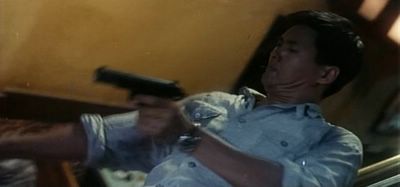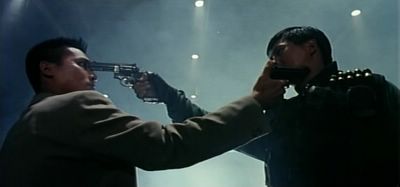
HARD-BOILED, director John Woo's last Hong Kong film before heading to the States, delves into the world of ruthless Hong Kong Triads. Chow Yun-Fat is Tequila, a tough, no-nonsense police detective. Crime in the city has reached a fever pitch. The police are using undercover agents to infilitrate gangs, but their lives are in jeopardy as much from their fellow officers, who are unaware of their true identities, as they are from the crime lords.
Tequila encounters Johnny Wong (Anthony Wong), a disrespectful young mob boss, and one of his newest men Tony (Tony Leung). Eventually Tequila will realize that Tony is an undercover agent. Will they be able to work together to win the battle, or will Tony have to turn on Tequila to retain his cover?
John Woo's poetically violent action sequences are his trademark, and HARD-BOILED features three stunning examples. An early scene takes place in a tearoom dotted with birdcages. A fierce gunfight breaks out. Bullets zip through the small space, and it's difficult to know exactly who are the good guys and who are the bad guys. Tequila packs heat in both hands and blasts his way through the villains. It's a crackling way to begin the film. Tequila's strength is established, and Woo gives us a taste of what will follow.
The second big action setpiece is set in a warehouse. Johnny Wong's gang raids the opposition's arsenal. They descend upon the warehouse as a vicious pack on motorcycles. Again, the high-octane action is chaotic.

The third major action sequence happens in a hospital and stretches over most of the film's second half. Woo gives his heroes plenty of obstacles to overcome, including hidden chambers in the ingenious production design. Some of the scenes in the hospital are shocking because the violence spills into places we aren't used to seeing it go. Innocent patients are gunned down. A bravura display of action occurs in the baby ward. Woo balances the reprehensible actions of the gang with the protective nature of the police but doesn't let it dip into exploitation or sentimentality.
HARD-BOILED houses an excessive amount of violence, although it is well in keeping with the Hong Kong tradition that extends from the Peking Opera. Since it is stylized violence, it doesn't feel as gratuitous or glorified as it might in an American film, and in fact, the domestic pictures which have mimicked Woo's style often seem coarser and uglier. The difference is the honor and respect that the heroes and some villains have for life. At one point in the hospital Tony faces off with Mad Dog (Philip Kwok). Patients and nurses fill the space between them. Both internally know they should lay their guns down until the innocent can get out of their way. It's an unusual scene for an action picture, as is what soon happens after they put their guns down.

The duality of good and evil is a central theme in Woo's films. HARD-BOILED compares Tequila and Tony instead of juxtaposing one with the villain. Tony is working to uphold the law, but in the process he must commit murderous acts, possibly against other police officers. He's also conflicted because he must destroy the people whose trust he has gained. Tony has a fond relationship with Mr. Pang (Philip Chan), one not unlike the Joe Pistone-Lefty Ruggiero connection in DONNIE BRASCO. One senses that turning in Mr. Pang and his sons would be hard enough, but Tony must commit a far worse betrayal. In order to protect the law, Tony must knowingly kill the guilty and innocent. Tequila, on the other hand, believes he is serving the public and taking out the enemy, but unwittingly he kills those on his side. Amid the many loud action scenes, a quiet conversation between Tequila and Tony captures the core of this struggle.
Grade: B
(This is a revised version of my Criterion DVD review. Follow the link for more information on the quality of and features on the DVD.)
No comments:
Post a Comment